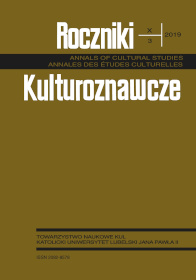Luxuria, grzech i kara. Przyczynek do badań ikonograficznych Ołtarza Sądu Ostatecznego Jheronimusa Boscha (i jego warsztatu) z Akademie der Bildenden Künste w Wiedniu. Część II
Luxuria, Sin and Punishment. A Prolegomenon to Iconographic Research of the Last Judgment by Jheronimus Bosch (and His Workshop) from Akademie Der Bildenden Künste in Vienna. Part II
Author(s): Grzegorz KubiesSubject(s): Fine Arts / Performing Arts, Visual Arts
Published by: Towarzystwo Naukowe KUL & Katolicki Uniwersytet Lubelski Jana Pawła II
Keywords: Jheronimus Bosch; early Netherlandish painting; Last Judgement; hell; Christian eschatology; lust (luxuria); musical iconography
Summary/Abstract: The Last Judgement kept in Akademie der Bildenden Künste in Vienna is currently considered by members of the Bosch Research and Conservation Project as the work of Jheronimus Bosch (c. 1450–1516) and his workshop. Within the Vienna Triptych there are many reminiscences and allusions to unchastity, lasciviousness and lustfulness. Although musical instruments—often linked with love in visual arts—appear in several scenes, in the Bosch literature musical aspects are often marginalized or even overlooked. The main purpose of this article, apart from the iconographic analysis of these several scenes (part I), is an attempt to find sources of connection between two elements in the vision of Hell: penalties corresponding to the sin of lust (luxuria) with music (part II). The musical scenes having their origins in miniature painting, also recall historical realities—aspects of private music making at the turn of the 15th and 16th centuries. The most important literary sources of inspiration for the painter we considered to be the Bible, Thurkill’s Vision and The Flowing Light of Divinity by Mechthild of Magdeburg. Correspondence of certain motifs in scenes depicting lust (The Wayfarer Triptych, The Haywain Triptych, The Seven Deadly Sins and the Four Last Things) with the parallel motifs in the Vienna Last Judgement proves the existence of a coherent mental-ideological system in the Bosch’s workshop in which the punishment of eternal damnation bears the stigma of earthly pleasures.
Journal: Roczniki Kulturoznawcze
- Issue Year: 10/2019
- Issue No: 3
- Page Range: 93-122
- Page Count: 30
- Language: Polish

